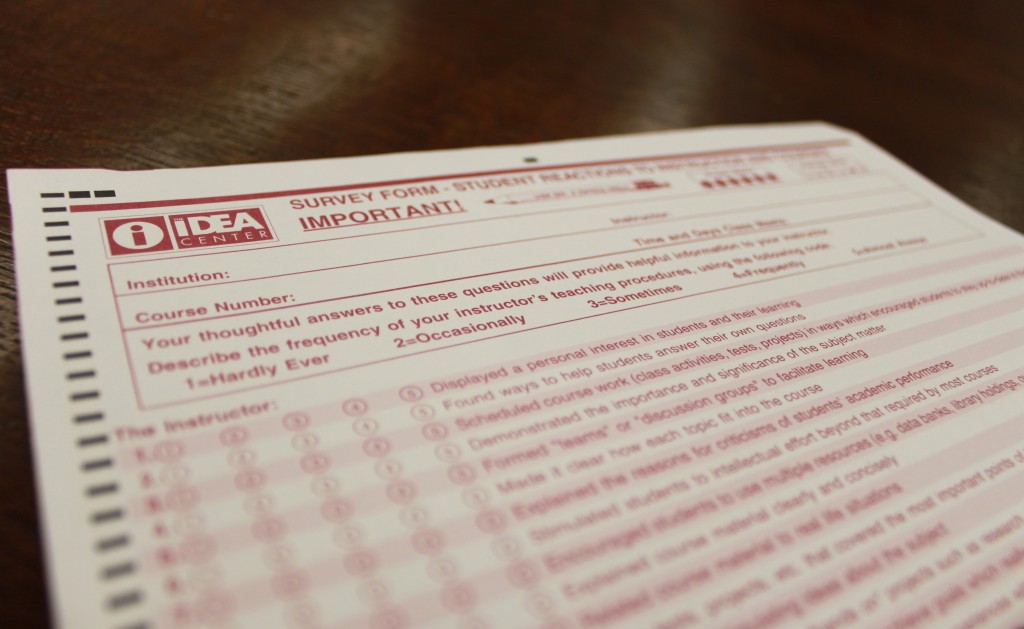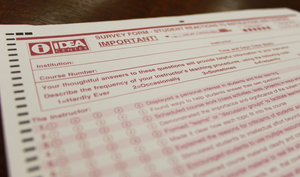With final projects, papers and exams on the horizon, course evaluations have been making their way into classrooms. But will students be completely truthful when rating their class and professor?

About 35 percent of students said they gave a “better-than-deserved” evaluation, while nearly 49 percent admitted to lying to make their instructor look worse, according to a 2010 University of Northern Iowa study.
Freshman Adam Ben Salem said he is usually honest when filling out the form but admitted to giving a professor a “better-than-deserved” evaluation.
“I think I tend to be honest most of the time,” Ben Salem said. “I might sometimes put a higher score than what I actually think, but I never choose the highest score or the lowest score, just always something in between.”
Sophomore Chloe Sershon said students may not always fill out the evaluation honestly because “they just want to rush through the form.”
“I almost don’t think anyone’s going to tell the truth because they’re going to fill it out the fastest they can, so they don’t have to think about it anymore,” Sershon said.
Michael Cogan, director of institutional research and analysis, said it is likely that students who are not performing well in class will not rate the course favorably.
“If a student’s doing really poorly in class, sometimes that’s because of the professor, sometimes it’s because of the student or maybe it’s because of the topic,” Cogan said. “I would imagine that they’re probably more likely to rate the course lower.”
Another study conducted by North Carolina State University in 2010 found that students who earn D’s and F’s in a course are 23 percent less likely to complete the course’s evaluation form. But Cogan said St. Thomas calculates the reliability of the evaluation for each course.
“The evaluation results can determine whether the total responses were reliable or not in terms of the number of students who completed the evaluation,” Cogan said. “Let’s say there were 32 students enrolled in the course and 28 students responded to the evaluation. So that’s 88 percent reliability.”
Cogan added that evaluation results include actual and adjusted scores to account for students who don’t fill out their evaluations honestly.
“By teaching statistics like I teach, my scores are typically adjusted upward because most people don’t want to be in the class,” Cogan said.” The idea is that if you’re teaching a class that’s not well-liked, you’re not penalized for that as a professor.”
Cogan said he does not believe St. Thomas students usually lie on evaluations.
“I don’t think our students are like that,” Cogan said. “For the most part, I think our students are pretty honest about what’s going on and forthright about what’s happening.”
Sophomore Destinee Stamer said she is one of those students.
“I feel like I’m pretty honest on course evaluations,” Stamer said. “It’s important when students express how they feel about the class and professor.”
Junior Benjamin Fahey agreed.
“I think I mark pretty accurately. Generally if it’s a good course and well taught, I usually give it a good review,” Fahey said. “Overall, I think St. Thomas students are pretty honest on [evaluations].”
Cynthia Johnson can be reached at john3175@stthomas.edu.


Perhaps students would take more time filling out course evaluations if St. Thomas was more transparent regarding how departments use the information gathered by these evaluations. If the administration does not appear to take the comments provided by students seriously, why should students take the time to full them out?
they are a waste of time. I have never been honest on any of them.
I knew a professor who said that his department chair told him that when evaluating him, he threw out the top and bottom evaluations. So, of course, the professor always turned out mediocre.
I know a professor who was denied tenure based on course evaluations. So, Dan, there’s one use for them. Be honest!
Personally, I’m always astonished by how quickly everyone else finishes. From my first class freshman year to my last round of evals as a senior last week, I have *always* been the last person to finish filling out my form. It always seemed to me that the comments are by far the most important part of the eval, so I think it’s good to put in some serious time and thought on them. However, the IDEA form is much better than the old SROT was at quantifying class and teacher excellence.
I used to take my time on the evaluation forms, and then UST switched to the awful IDEA forms. Heaney, we should talk sometime about why you think the IDEA forms are better than the old ones… personally I find the idea forms to be a waste of my time. Even on the short form, the majority of the questions don’t apply to the class, and they also got rid of questions they could use to further break-down the results (like “what grade are you expecting in this class”). With IDEA forms I ALWAYS go down the page with all 5’s, because I try to make up for the other idiots who slack hard and then blame the teacher for their bad grade (with the exception of the “I wanted to take this class regardless of who taught it”, which gets a 1). The old form had space for comments about each question, all of which I’d always fill out, plus the questions actually were more relevant and seemed like they’d be more useful in helping profs improve their courses. I’ve talked to a few profs who were in on the design of the old forms, and they also tell me they find the new one’s very un-helpful.
I always try to be as honest and constructive as I can on the course evals. I think the evals would be far more useful if they were tailored specifically to the class, or at least the department. For example, I’m a physics major, and most of my classes are science or math related, so there’s really no point in my answering how the class helped increase my creative capabilities or gained an appreciation for music and art. I understand St. Thomas trying to streamline the process by using the same form for every class, but I think some students think it less useful because of this, and therefore take it less seriously. Yes, there is a space for departments to include their own optional questions, but I rarely have seen that utilized.